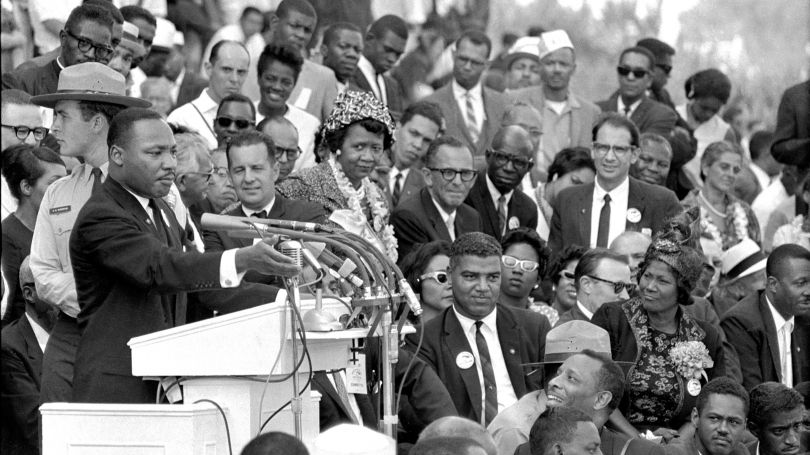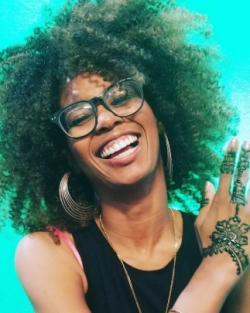Each year, Dartmouth celebrates Martin Luther King Jr.'s life and legacy with a slate of events. The all-virtual 2021 celebration—which will take place over the course of the next two weeks—embodies the theme that emerged during 2020: hope and action.
The Hope and Action Celebration features keynote speaker Shamell Bell, an original member of Black Lives Matter and a lecturer in African and African American Studies and the Department of Theater. Bell, who is also a dancer and choreographer, will guide participants in "Collective Freedom Dreaming," an exploration of their individual and collective visions for the future, at 7:30 p.m. on Jan. 18. See the complete schedule of events.
Bell says the event will be a "radical embodied dialogue to imagine shared liberation," drawing inspiration from King and from her mentor, Robin D.G. Kelley, whose book Freedom Dreams changed her life.
"I feel collective Freedom Dreaming is so much more fruitful than any lecture I could give on MLK during this pivotal moment," says Bell, who notes that she rejects the notion of a "charismatic leader," and no longer accepts requests for keynotes. "I always bring my community with me. ... Group centered leadership is important to my core values as a community organizer and educator. They call me a 'visionary instigator,' with the role to advocate, gather, and amplify."
The community gathering will feature student organizers from Bell's class and members of her collective, Street Dance Activism, and include a Q&A.
Hope and Action
While hope and action are traditional elements in Dartmouth's Martin Luther King Jr. celebration programming, the events of 2020 made them feel especially vital, says Kara Wakefield, program manager in the Office of Institutional Diversity and Equity and co-chair of the MLK Committee.
"We've seen a whole year of protests around systemic inequities. We've seen COVID devastate our nation and the global community, and highlight a lot of entrenched systemic injustices," Wakefield says. After such a difficult year, "having both the hope and action pieces felt really important to us."
Rabbi Daveen Litwin, dean and chaplain of the William Jewett Tucker Center for Spiritual and Ethical Life, says the commemoration of King's life and work is "the story of our nation."
"The MLK events created by students, faculty, and staff across the College reflect history and the palpable, ongoing relevance of Rev. King in this moment," Litwin says. "Hope and action are necessary for the work of transformation required to build a more truthful, just, and equitable future."
Programs, Both New and Familiar
For those acquainted with Dartmouth's MLK Celebrations, many of this year's events will be familiar.
Geisel School of Medicine is hosting several talks and discussions, including "The COVID-19 Pandemic and Health Inequalities: An Opportunity for a Radical Revolution in Healthcare," at 2:15 p.m. on Jan. 16. The presenter, Roy Wade Jr. Geisel '07, is a general pediatrician at Children's Hospital of Philadelphia, Cobbs Creek.
The Nelson A. Rockefeller Center for Public Policy and the Social Sciences will host lecturer Clayborne Carson, founding director of Stanford's King Research and Education Institute. Carson's talk, "Where Do We Go From Here? King's Still Unanswered Question," is set for 7 p.m. at Jan. 19.
The annual Multifaith Celebration, featuring the Dartmouth College Gospel Choir and keynote speaker Tricia Rose, director of the Center for the Study of Race and Ethnicity in America at Brown University, will take place at 3 p.m. on Jan. 24.
And "Conversations with Changemakers," a panel discussion with the recipients of this year's Martin Luther King Jr. Social Justice Awards, is set for 7:30 p.m. on Jan. 28. The awards honor Dartmouth community members who have made significant contributions to social or environmental justice, peace, civil rights, education, or public health.
This year's schedule also includes new and reconfigured programs.
Instead of the annual Martin Luther King Jr. Celebration Breakfast, the Office of Human Resources will offer an employee workshop from 8:30 to 10 a.m. on Jan 18.
This year's films will be available on demand as part of the Hopkins Center for the Arts' Hop@Home Film Series. Nationtime, a documentary chronicling the 1972 National Black Political Convention, opens today. Coded Bias, which explores embedded racism and privilege in the world of technology, will be available starting Jan. 21.
Another new event, "How We Study Race: A Discussion Across Disciplines," is set for 7 p.m. on Jan. 25. The panelists include Kimberly Juanita Brown, associate professor of English and Creative Writing and co-director of the Consortium of Studies in Race, Migration, and Sexuality; Matthew F. Delmont, the Sherman Fairchild Distinguished Professor of History and a Special Advisor to President Hanlon for faculty diversity; Deborah K. King, associate professor of Sociology; and Eng-Beng Lim, associate professor of Women's, Gender, and Sexuality Studies and director of the Consortium of Studies in Race, Migration, and Sexuality. Sonu Bedi, the Joel Parker 1811 Professor in Law and Political Science, and the Hans '80 and Kate Morris Director of the Ethics Institute, will be the moderator.
This year's lineup reflects the committee members' enthusiasm for creating important programming despite the pandemic, says Dvora Greenberg Koelling, assistant director of Conferences and Events, and the MLK Committee co-chair—and they hope the offerings will be helpful to participants as the country prepares for the transition of power in the White House.
"We know that people's attention is going to be very much on the inauguration and what is happening in Washington, D.C., and across the nation," Greenberg Koelling said. "We're hoping that the programming can be a respite, or that it can be empowering and complement the energy that is already going to go toward the political events happening this week."
For the latest information on Dartmouth's response to the pandemic visit the COVID-19 website.
Aimee Minbiole can be reached at aimee.minbiole@dartmouth.edu.

